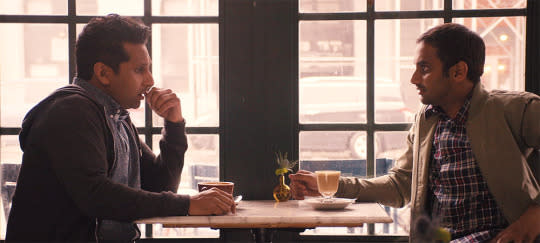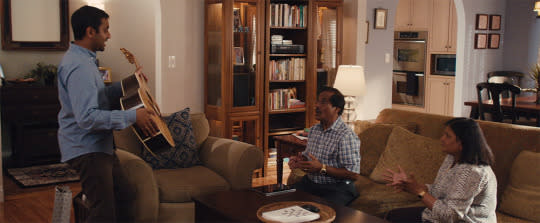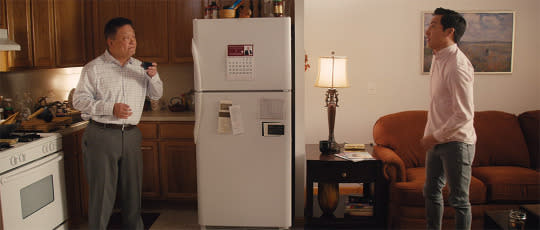Emmy Talk: ‘Master of None’ Co-Creators Aziz Ansari and Alan Yang on ‘Parents’ and ‘Indians on TV’

Ravi Patel and Aziz Ansari in ‘Master of None.’ (Photos: Netflix)
As we enter Emmy season — nomination voting runs through June 27 — Yahoo TV will be spotlighting performances, writing, and other contributions that we feel deserve recognition.
When can a TV series be about race without being about race? When that series is Master of None, the quietly revolutionary Netflix comedy created by Aziz Ansari and Alan Yang. I say “quietly” because neither the show nor its creators are seeking to make any grand, sweeping statements about shaking up the status quo in regards to diversity on television. For one thing, that’s a change that’s already happening, thanks to popular half-hour shows like Black-ish, Fresh off the Boat, and The Carmichael Show, which preceded the November 2015 premiere Master of None.
And even as Ansari and Yang — who previously worked together on Parks and Recreation — can be considered part of that ongoing evolution, their show also stands distinctly apart from the pack. Those series, after all, are grounded in the tradition and language of family sitcoms; Master of None instead hangs itself on the “single guy in the big city” hook that was previously the domain of actors who looked like Ryan Reynolds (Two Guys, a Girl and a Pizza Place), Jonathan Silverman (The Single Guy) and, of course, Jerry Seinfeld (Seinfeld), rather than Ansari’s Indian-American alter ego Dev Shah. In fact, Master of None feels like the natural heir to ’90s Emmy darling Seinfeld in the way it manages to find consistently hilarious and inventive ways of saying everything and nothing at the same time. “That’s the goal, right?” Yang asks Yahoo TV. “We don’t ever want the show to feel afterschool special-y, but we also want to address things that interest us and make us really excited to talk about.”
Related: Review: Aziz Ansari’s ‘Master Of None’ Is Netflix’s Best Comedy Yet
Two episodes in particular highlight how expertly Ansari and Yang are able to tackle big ideas in almost casual ways. In “Parents,” the second episode of the show’s first season, Dev and his buddy Brian (Kelvin Yu) gradually awaken about the privileges they’ve enjoyed as second-generation immigrants, as well as the sacrifices their parents made in leaving their respective homelands for the hopes of a better life in America. (Adding to the semi-autobiographical nature of the series, Ansari cast his own parents as Dev’s mother and father.) And the fourth episode, “Indians on TV,” addresses the challenges of being a minority actor in the film and television industry, a subject that Ansari has previously incorporated into his stand-up act.

Aziz and his real-life parents, Shoukath and Fatima.
Although these twin premises would be easy fodder for the Very Special Episode treatment, Master of None refrains from couching its message in a heavy-handed way. And in doing so, the series makes those messages relatable to a wider audience, which might otherwise tune out at the slightest suggestion that they’re being lectured. That may sound like an eminently logical creative approach, but Ansari says he’s all too familiar with TV executives who haven’t been able to connect those dots. “If you try to pitch an episode like ‘Parents’ or ‘Indians on TV,’ people will be like, ‘Well, I don’t know if a mainstream audience will really relate to these topics,’ which is basically coded language for, ‘I don’t think white people want to watch this episode that’s about Indian s***.’ My whole life, I’ve had to watch movies and TV shows about middle-aged white guys and their problems, and have related to so many of them. You don’t have to be Indian to connect to ‘Indians on TV,’ because it’s an interesting topic, and it’s funny and well done.”
In a wide-ranging conversation, Ansari and Yang talked about using Master of None as a vehicle to tell relatable stories in new ways, how diversity on TV is ultimately a numbers game, and Busta Rhymes’s formidable improv skills.
Aziz, you’ve discussed your parents’ immigrant experience in your stand-up act in the past. Was it a subject you knew you’d be expanding on for Master of None?
Aziz Ansari: When Alan and I first started talking about the series, “Parents” was one of the earliest episodes we thought of. There’s little bits of changes here and there, but basically my parents’ story is there, and so is Alan’s father’s story. Everything about him having to eat his pet chicken is real stuff from his life. Talking about it, we realized that anyone that came to America as an immigrant has a crazy story. And most of their kids have no idea what their parents did to give them these pretty cozy lives they have [here].
Did you always plan to cast your own parents?
Ansari: No, we auditioned some actors, but there’s not a ton of older Indian people that are acting in New York. And when we auditioned people, a lot of times they felt like people that were doing impressions of my parents. We’re very sensitive to how immigrant parents will be portrayed, because a lot of times they’re portrayed in ways that are very caricature-y, and it’s kind of an offensive thing. We really wanted to make sure these characters felt real, and since we based them on my parents, it was like, “All right — what if we just have them do it?” My dad was very enthusiastic about it; my mom [was] less so but we were able to convince her to do it, and I think they did a really great job. The thing when you’re working with non-actors is if you’re able to do it right, you’re able to get these performances that feel very real and natural, and I think that’s what we got.
Was that one of the reasons you directed that episode — to help put them at ease?
Ansari: That was definitely part of the reason. Obviously, I have a good rapport with my parents and was able to help them since it was the first time they’d really acted.
Alan Yang: We wanted the episode to be in the vein of a Richard Linklater movie, where sometimes you cast people who aren’t necessarily super-experienced actors, but the goal is to get this emotional truth out of [them]. I’ve known Aziz’s parents for years now, and his dad used to bug me about putting him in Parks and Recreation. It’s not the most organic thing for an Indian gastroenterologist from South Carolina to be in the Parks world, but we’re so glad we found a place for him in this world. [Laughs]

Clem Cheung and Kelvin Yu
It’s an interesting story to tell from an American perspective, as other cultures emphasize honoring your elders in more pronounced ways.
Yang: In other countries, it’s a little bit more expected that you venerate your parents, or at the very least show your appreciation for them frequently and visibly. In America, it’s a lot more about independence and finding your own way. We wanted to point out that, in some cultures, it’s not in the parents’ nature to share. That’s not true of everybody, but definitely true for our specific parents. They’re a little bit more closed off than white people.
Ansari: We wrote this episode and it was very personal to us, and we didn’t realize what a universal appeal it would have. I was on a flight one time, and the captain came by and was like, “I just watched that episode of your show; I’m white, but my parents are immigrants, and it really hit home with me.” I don’t know anyone that has a drama-free relationship with their parents, so I think it relates to everyone in that sense, and if you have parents that are from a different country, it hits this whole other level.
Turning to “Indians on TV,” that episode seems even more relevant in light of the #OscarsSoWhite controversy from earlier this year. But it’s also rooted in personal experiences that you’ve addressed before.
Ansari: It’s definitely an issue that was in our heads. There aren’t a lot of stories that are told that have the perspective of someone like Dev. Or you look at Episode 9, when my character hasn’t told his parents about his girlfriend and she’s upset about it, and doesn’t understand the cultural differences. That’s a new story I hadn’t seen before, and when I talk to other Indian people or Asian people, they’re like, “Yeah, I’ve went through that, but I’d never seen that depicted on TV before.”
Yang: The big thing that’s been in the news recently is the absence of leading roles. There are just so few leading roles, especially in film, but even on television. It’s especially frustrating when there’s a role that’s specifically Asian or specifically Indian or specifically a certain race and they bypass a chance to create a new star. There’s that whole Ghost in the Shell casting issue were they cast [Scarlett Johansson] in a role that was originally an Asian woman. The excuse the studios always make is, “We want to cast a movie star.” But it’s a chicken-and-egg scenario, because there are no Asian movie stars right now! There are so many great actors out there, but because none are [movie stars], then by default, they never will be.

Ansari and Busta Rhymes
I have to ask how the hilarious Busta Rhymes cameo in the Knicks VIP suite came together.
Yang: We thought it would be funny to have an actual celebrity at the VIP suite, and Busta is based in New York. We had a very packed day, because we were shooting in both the suite and courtside in Madison Square Garden, and it took a lot of work to get that taken care of. We were crossing our fingers that Busta would be on time, and not only was he on time, he showed up at 7 a.m.! I offered him a script to look at, and he said, “I’m off-book.” It’s basically a minute-and-a-half-long scene with no cuts, and he nailed it every single time. He also improvised that line at the end of the scene where he goes, “Good luck, I’m gonna f*** with some of these shrimp.”
That episode ends with Dev and another Indian actor almost being cast in a Perfect Strangers remake. It sounds like a terrible idea, but does the fact that it would offer minority actors a high-profile television project make it seem more palatable?
Ansari: The Perfect Strangers reference was just a joke. I think the bigger issue is having more minorities [involved] in every aspect of the creation of these shows. A lot of times we don’t have as much diversity running things, and because Alan and I run our show, that’s why there are episodes like “Parents” and “Indians on TV.” Our opportunity came from Mike Schur, who hired both of us for Parks and Recreation. Without that experience, we wouldn’t be in the place to do Master of None.
Yang: On top of that, I think it’s a numbers situation. As soon as we get to a point where there are more than one or two or three Asian shows or Indian shows, then you’ll start to be in a situation where, yes, one can be a broad comedy, one can be more of an Indian comedy, and one can be a drama. There’s 400 scripted shows on TV right now — more than there’s ever been before. So numbers-wise, there’s room for 80 shows starring Latinos or there’s room for 20 shows starring Asian people. Once we get to that point, then we don’t need every Asian show to represent every Asian person.
Master of None is currently streaming on Netflix.
Read more Emmy Talks:
Emmy Talk: ‘People v. O.J. Simpson’ Star Sterling K. Brown
Emmy Talk: ‘The Americans’ Star Alison Wright
Emmy Talk: ‘Jessica Jones’ Star David Tennant
Emmy Talk: ‘The Grinder’ Fred Savage
Emmy Talk: ‘Silicon Valley’ Star Thomas Middleditch
Emmy Talk: ‘Crazy Ex-Girlfriend’ Songwriting Duo Rachel Bloom and Adam Schlesinger
Emmy Talk: ‘House of Cards’ Star Joel Kinnaman

